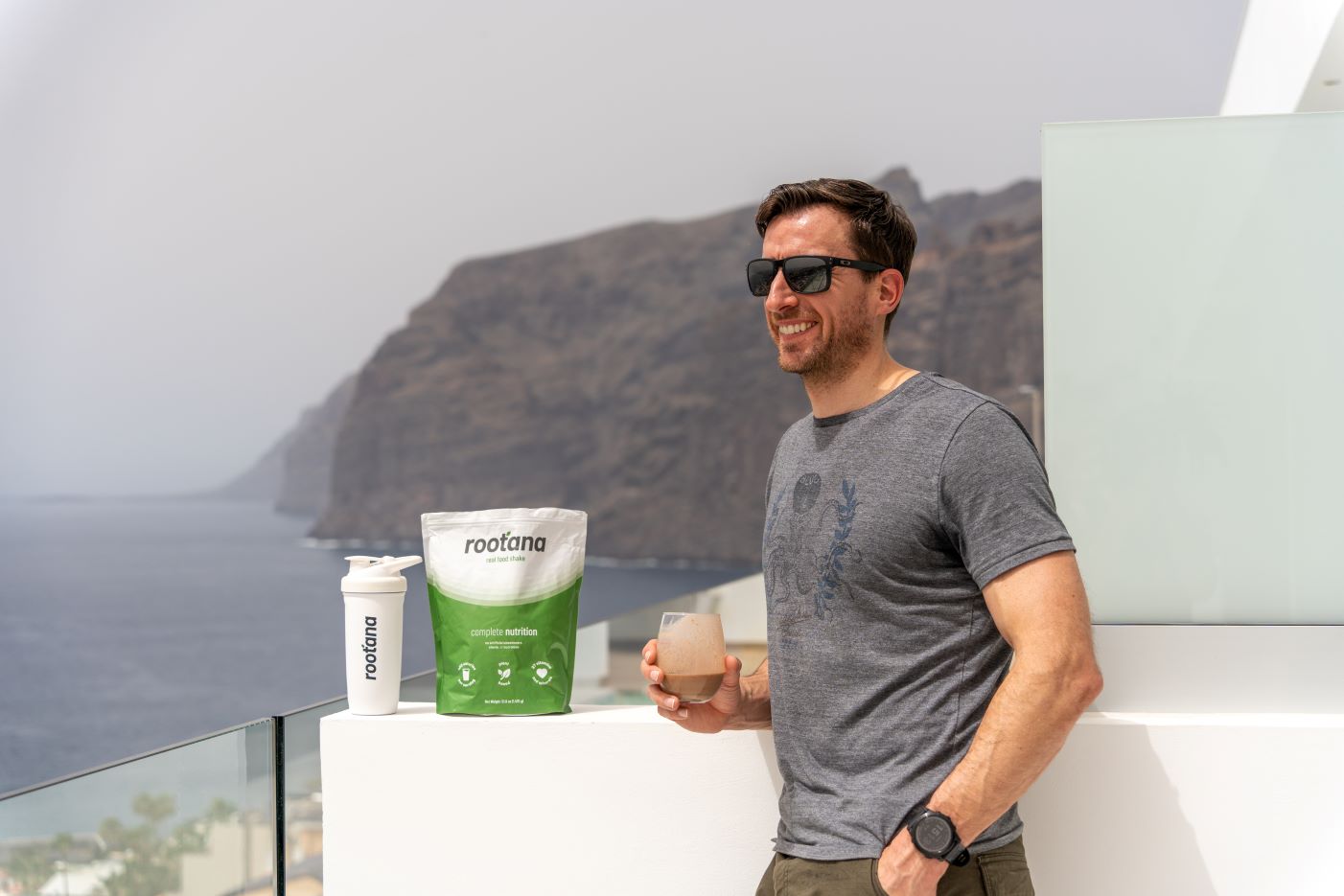Rootana vs Yfood
Comparisons are often drawn between Yfood and Rootana, especially Yfood’s vegan powder. They’re both environmentally conscious companies and both hail from the UK, though differences become more apparent the closer you look. This begs the question, Yfood vs Rootana, which one is the best?
Well today we’re going to be comparing them in order to determine which is the best overall.
| Category | Rootana | YFood |
|---|---|---|
| Calories per serving | 400 | 400 |
| Flavours | 2 | 10 |
| Protein | 20-21g | 25g |
| Fats | 14-16g | 17g |
| Carbs | 43-44g | 33g |
| Fiber | 7-9g | 6g |
| Micronutrients | 27 | 26 |
| Servings per pack | 14 | 17 |
| Vegan friendly | Yes | Yes |
| Artificial sweeteners? | No | Yes |
| Subscription available? | Yes | Yes |
Rootana vs Yfood Ingredients List
The beating heart of all meal replacement shakes is the ingredients, and as such the biggest differences tend to be found in the choices made here. You can see this as there are only a few shared ingredients between the two:
Rootana’s formula is a blend of oat flour powder, pea protein isolate, golden milled flaxseed, sunflower seed oil, sunflower lecithin, coconut sugar and then some minor ingredients such as potassium chloride, magnesium phosphate, guar gum, xantham gum, and salt.
Yfood has some different options, but we’ll be comparing its vegan powder today. This formula contains vegetable proteins (soy, pea, sunflower) vegetable oils (sunflower, rapeseed), rice flour, soluble corn fibre, modified starch, waxy corn starch, quinoa flour, gluten-free oat fibre, tapioca starch, acerola powder, blueberry powder, maltodextrin, colour carotenes; salt, sweetener sucralose
First of all, you can see that there are a lot more ingredients in Yfood, which may intuitively feel like a better deal but is more often than not a sign that the formula is a bit unfocused. Rootana manages to hit all of its macros well with just 11 carefully selected ingredients and doesn’t have to rely on anything artificial to do so.
The use of maltodextrin can be an issue for some, as it has a higher GI score than table sugar. This means that the powder can cause a spike in your blood sugar, making you more likely to experience a sugar crash and all of the lethargy that is associated with this. Repeated spikes in your blood sugar can cause heart problems, kidney problems, and problems with your eyesight [1] and over time will increase insulin resistance [2].
Rootana vs Yfood Macros
For this section, we’ll look to compare Yfoods Vegan Vanilla with Cacao flavoured Rootana. There are subtle differences between the two Rootana offerings, with the original flavour containing 21 more calories with more protein and healthy fats.
- Rootana contains 400 calories, with 14 grams of fats, 43 grams of carbohydrates, 9.4 grams of fibre, and 20 grams of protein
- Yfood contains 400 calories,, with 17 grams of fats, 33 grams of carbohydrates, 6 grams of fibre, and 25 grams of protein
They’re quite similar in this regard, with Rootana containing more complex carbohydrates to provide a slower release of energy, and Yfood containing slightly more fats and protein.
Rootana’s formula follows the Food and Nutrition Board of the Institutes of Medicine, as they recommend a macro split of 45-64% carbs, 20-35% fats and 10-35% protein [3].
Rootana vs Yfood Sweeteners
There have been differences already between the two, but Rootana’s whole philosophy stems from two simple words: Nothing Artificial. This sets Rootana apart from the crowd and has led to a formula containing nothing but real food, opting to sweeten shakes with natural coconut sugars.
Despite coconut water tasting quite sweet, coconut sugars are actually derived from sap from the coconut tree, and instead of being processed like regular sugar, it’s left out to dry in the sun where they crystallize into what we call coconut sugar.
Yfood has taken a different approach and opted to include sucralose to sweeten its formula. Sucralose is made in a lab by taking regular sugar and putting it through a multi-step process in order to create a sweetener with zero calories. It was approved as safe for human consumption by the FDA in 1999 [4] but there is conflicting research on the safety of sucralose.
Such conflicting research includes evidence that it spikes blood sugar and increases insulin resistance [5], and decreases beneficial gut bacteria by 50%, with it being found that the gut bacteria had not recovered after 12 weeks [6].
Meanwhile, the coconut sugar used in Rootana contains micronutrients such as iron, zinc, calcium and potassium, as well as polyphenols and antioxidants [7] and has a lower GI score than sugar [8].
That being said, it is still added sugar, which is why Rootana has opted to use very little of it, intending to provide a subtle sweetness to its formula that, thanks to such a careful choice of real food ingredients, lacked the need to cover up any bitterness that alternatives often require.
What About Taste? Price? Variety?
Going by taste is highly subjective, and can be difficult to discuss. While Yfood has many flavours, it also contains sucralose which provides a highly-sweet taste that many people dislike. Rootana’s use of natural coconut sugars which provide a more subtle taste is one of its biggest draws for new customers. If you are looking for a meal shake that avoids artificial sweeteners and focuses instead on providing you with the best quality ingredients then Rootana is the obvious choice.
References:
1 – https://pubmed.ncbi.nlm.nih.gov/30246883/
2 – https://www.cdc.gov/diabetes/basics/insulin-resistance
3 – https://pubmed.ncbi.nlm.nih.gov/16004827/
4 – https://www.fda.gov/food/food-additives-petitions/aspartame-and-other-sweeteners-food
5 – https://pubmed.ncbi.nlm.nih.gov/23633524/
6 – https://pubmed.ncbi.nlm.nih.gov/18800291/
7 – https://www.mdpi.com/1660-4601/20/4/3671
8 – https://www.sciencedirect.com/science/article/pii/S2772566922000477


